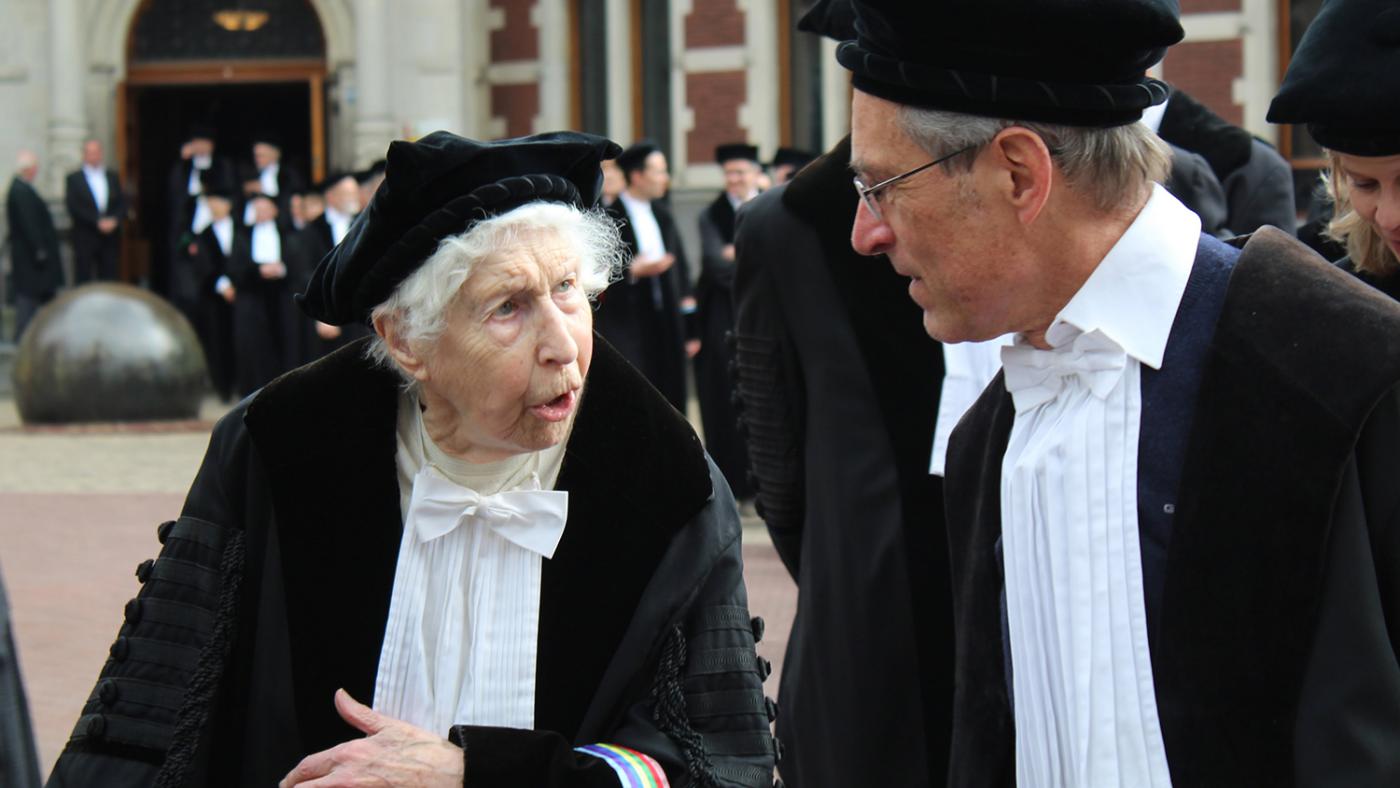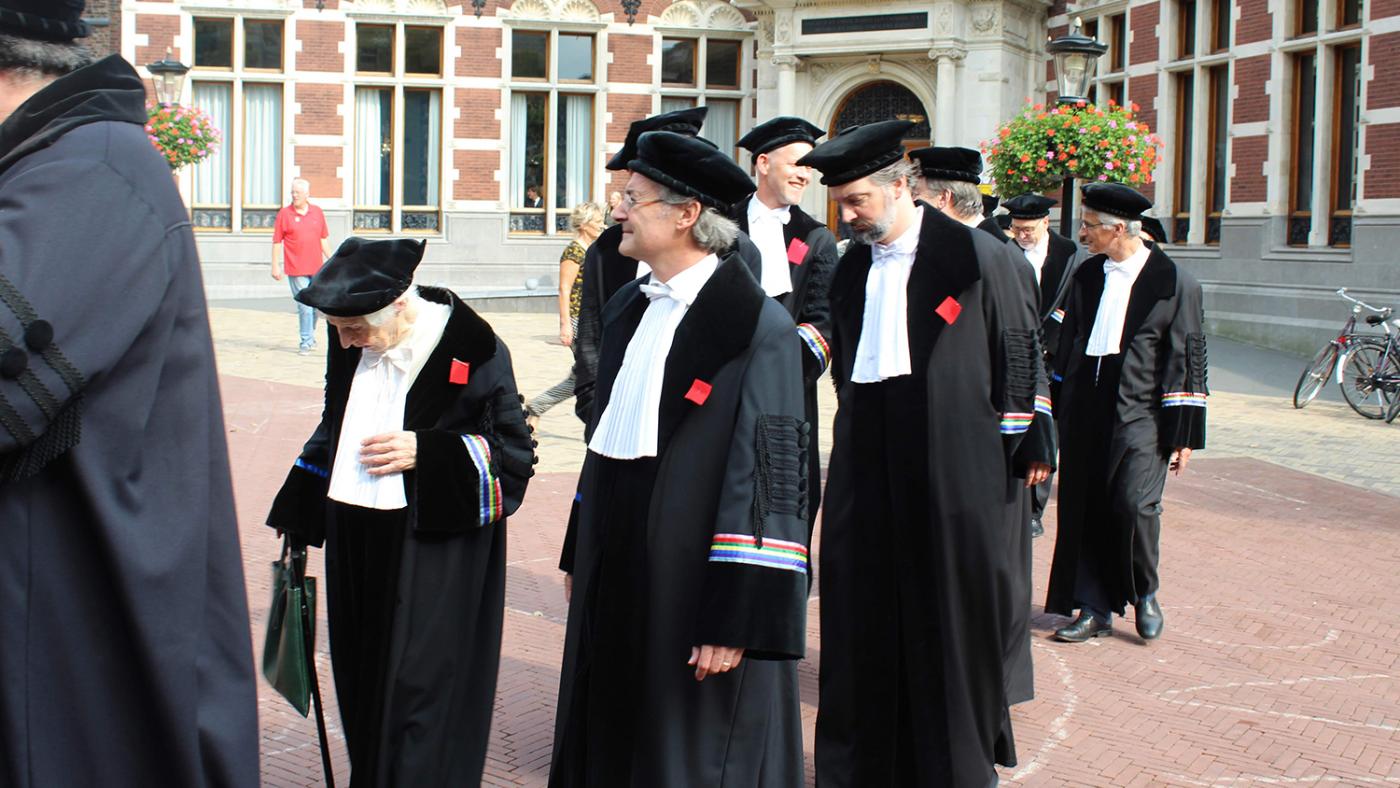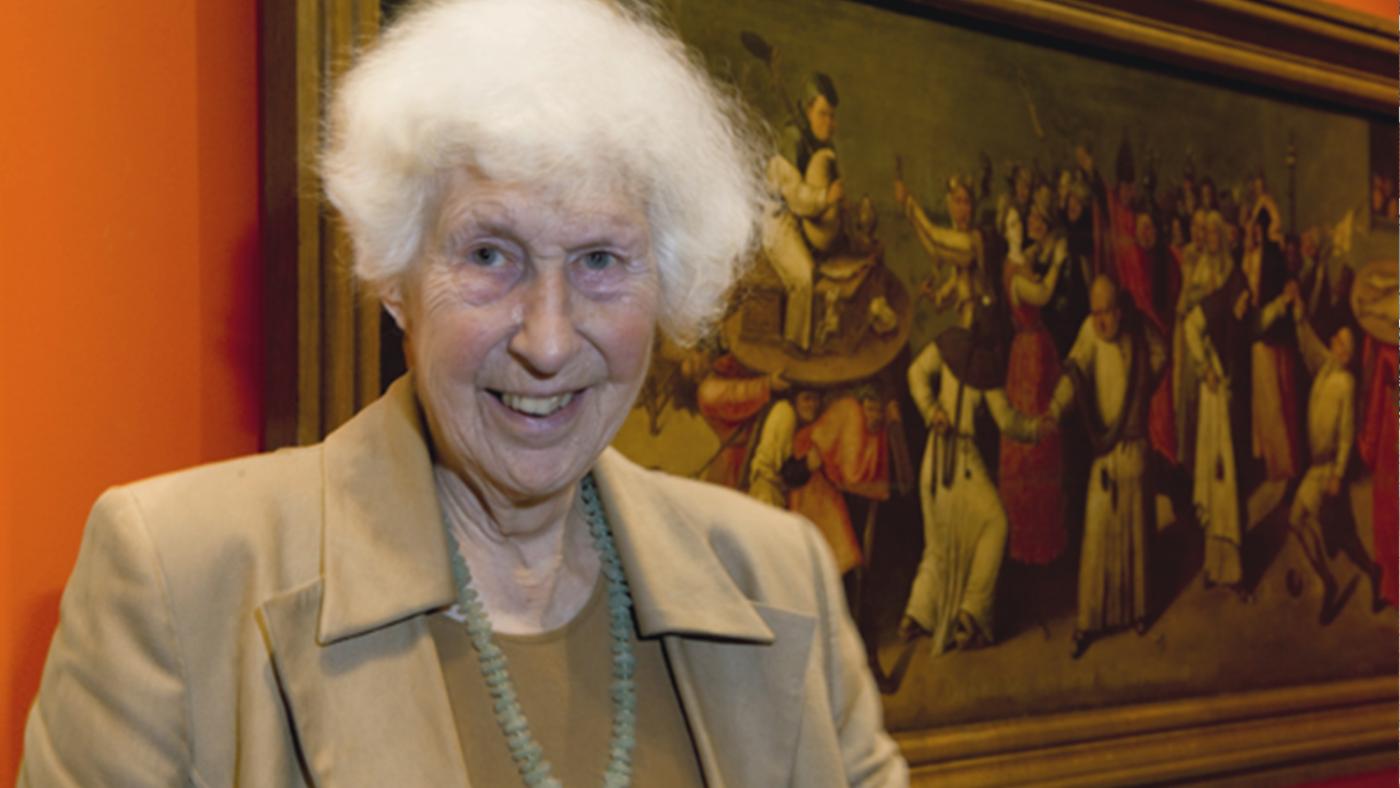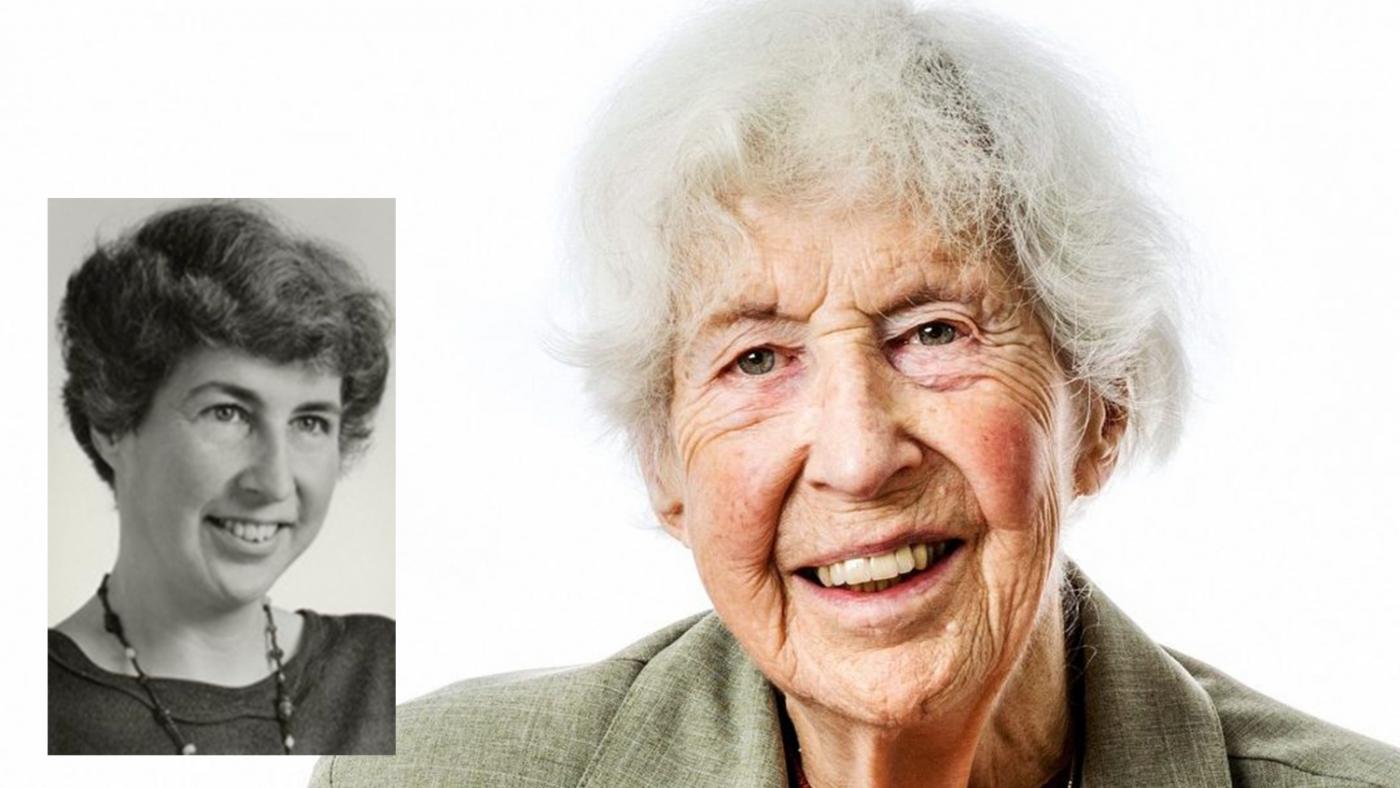95 years old and still committed to UU
Emerita Marietje van Winter feels connected to younger generation

The landline phone rings loud and shrill through the apartment on Keizerstraat where Marietje van Winter has been living for twelve years. Prior to that, she used to live in Brigittenstraat, also in the Utrecht city centre. She speeds to the other side of the space — a little hunched but with a firm step.
“Hello? Who? The eye fund, you say? Yes, that’s right, I’m a donor. You’re welcome but I don’t have time for this now.” Van Winter walks back at a more relaxed pace and takes a seat. She speaks clearly and with quite a volume, and is well articulated. “They call to thank you but they’re also hoping you’ll give them more money. But I think we're good now.”
The historian sponsors over forty charities. “I keep track of them for my tax declaration, which I still do all by myself. I would recommend making periodic donations to everyone because it’s tax deductible.”
The university is developing in an unnatural way
Van Winter is an organised woman who thinks about her expenses carefully and only donates to trustworthy charities, such as Stichting Mensenrechtenvrienden (the Human Rights Friends Foundation, Ed.), which is supporting the Iranian opposition. She used the inheritance she got from her father, who was a professor of Recent History in Groningen, to found the Professor Van Winter Foundation, an organisation that supports historical research. Asked what all these donations say about her character, she says: “I don’t know. I think it’s necessary.”

Van Winter also thought it was necessary to join the so-called red squares protest, against high workloads in academia, five years ago. “The university is developing in an unnatural way. It just keeps on growing yet with less and less money.” This is not the only trend she follows with suspicion. “I don’t think the university should be for everyone as that inevitably implies a drop in quality. One thing I’m very unhappy about is that everything is supposed to be in English now. The STEM courses can be taught in English but Humanities can’t. Dutch subjects should be taught in Dutch, for a Dutch audience. You can be much more nuanced in your mother tongue than in a second language. We should cherish our mother tongue because it allows us to express ourselves delicately and subtly. It’s also frightening to see how much the knowledge of German and French has deteriorated.” She follows the news about the university closely through DUB and by attending official events, such as the ceremony that marks the beginning of the academic year.
My relationship with students was less formal than usual
Walking amongst people almost thirty years her junior, Van Winter barely feels a generation gap. “I feel like I belong to the generation of people who are now about seventy. I also religiously attend the farewell lectures of former students of mine, like the one by Frits van Oostrom, which is coming up.”
These people were her students in the 1960s, when "they wanted to get rid of the old-fashioned model that was characterised by professors who ruled the place and weren’t open to new ideas. I thought they were right about everything. Our relationship was less formal than usual at the time. Even when I became a professor instead of just an employee, I made everyone call me Marietje. The people of this generation still do that.” Another reason why she was popular among students was how quick she was with her grading.
Things weren't as smooth with peers from her own generation, though. “Young people saw something in me and so did older people. But my peers didn’t. How was that possible? I don’t know. But I know I wasn’t loved by people my age. I was bullied at primary school and I armed myself against it. Like 'Whatever, boys. You’re just talking. I’m not going to care.'”
I was never invited to tea parties by my colleagues, even after becoming a professor
She carried the same attitude throughout her career. “I was accepted because of my scientific achievements but I was obviously unpopular. Sometimes my colleagues didn’t want me to have things. Maybe they were jealous. The fact that I got my PhD cum laude didn’t work in my favour. It took another ten years before I became a lector (a rank just below professor at the time, Ed.). Honestly, based on my scientific achievements, I should have joined the Royal Netherlands Academy of Arts and Sciences (KNAW) but it was pretty clear that my colleagues didn’t want that. I was not invited to their tea parties, even after becoming a professor. Even though I had an important role that carried the department through tough times. No, I don’t think it was because I’m a woman. Perhaps others, including men, recognise this phenomenon. I’ve accepted it and it didn’t make me bitter. I would still invite others to my house for tea parties. From a young age, I'd gotten used to peers not liking me. You have to learn to live with it. It was what it was. Nowadays, there are barely any people my age left, so that problem has solved itself.”
Her social circle consisted, and still consists, of people much younger than her. For years, she had a PhD club and a review club that met on a regular basis but both projects have been put on hold since Covid. She doesn’t see many people and prefers not to host any unannounced visitors. One day, a long time ago, two young students just showed up at her place. She didn’t have anything to offer them and didn’t know what to do with them.
Van Winter is used to being alone. She’s never been lonely. “No, I’ve always had plenty to do. I was always working on science. I’m also always busy appreciating art. It may sound weird but I get a lot of social contact from living and dead artists. When I look at old or modern art, it’s like I’m meeting the artist. When I look at a painting, I’m in contact with a personality. A living presence. I visit museums and galleries by myself – a little less often lately because I’m not as mobile anymore. But I still explore Utrecht on the regular."
I hope to stay clear-headed until the end
She empathises with students, who have been feeling increasingly lonely. “Covid has been obviously detrimental to networking. But, in general, I think young people need a little more self-awareness and confidence. What you do has to be meaningful to you. It doesn’t matter what others think.”
Herself, she is motivated by her curiosity, which has taken her quite far. She specialised in Medieval and Guelders history. Her thesis, titled Ministries and Knighthood in Gelre and Zutphen, is still considered a seminal work. She also focused on medieval cooking and nutrition, a discipline she’s still working on. On the table in front of her lies a book called Scent — The forgotten sensation, by Frank Bloem. “He’s a perfumer and he's coming to visit me soon. A friend from medieval cooking sent him my way. I’m working my way through an Egyptian cookbook from the fourteenth century. Together, we’re going to see whether we can reproduce all the scents. I can get most of the spices but not all of them. I’m missing spikenard oil and something valerian-like, so he will bring those. Isn’t that exciting?”

Van Winter is proud of what she’s achieved. A day before the interview, there was a conference by the Royal Dutch Historical Society about food history. “You can truly say that nutrition research has had quite the career boost,” she comments. In addition, many of the things she’s studied about the province of Guelders (In Dutch, Gelderland, Ed.), such as ministries and knighthood, were replicated in other provinces. She would like to remain a source of information for others. “After all, I hope to remain clear-headed until the end.”
She’s always loved solving scientific puzzles but, in her opinion, didn't always get the recognition she deserved. Sometimes she felt like a voice crying in the wilderness. For instance, she says that in the list of counts of Holland, there’s still someone named Dirk who’s never mentioned anywhere, and the church of King Dagobert, from 625, was in a different location in the city centre of Utrecht than people think. She faced resistance and opposition, even though she had documentation to prove it. “But they’ll figure it out. At a certain point, someone will show up who won’t let themselves be intimidated and they will say I’m right.” She won’t lose a minute of sleep over it.
Not worrying about what other people think, trusting yourself at all times and walking your own path: Marietje van Winter has never done anything but.

Photo: Allard Willemse / Editing: UMU
Johanna Maria van Winter
Johanna Maria van Winter (best known as Marietje) is a member of nobility: she has the title of damsel. Her father, Pieter Jan van Winter (1898-1990) was a professor of National History at the University of Groningen. Marietje and her sister are the last remaining members of the Van Winter family. The emeritus professor studied History at the University of Groningen and the University of Ghent, with a focus on the Middle Ages. In 1962, she obtained her PhD with a thesis titled Ministries and Knighthood in Gelre and Zutphen. Since 1963, Van Winter has been researching the Johanniters, a religious knight order, about which she wrote the book Sources concerning the Hospitallers of St. John in the Netherlands, 14th-18th centuries, published in 1998. In 1953, Van Winter started working for Diederik Enklaar in the discipline of Medieval History. She obtained a lectorate in 1972 and became a professor of Medieval History in 1980. She stepped down from that position in 1989 but still remained active in science, focusing on the nobility of Guelders, medieval cooking, and nutrition. She owns a print collection of about 800 works, which she’s leaving to the Rijksmuseum in Amsterdam.